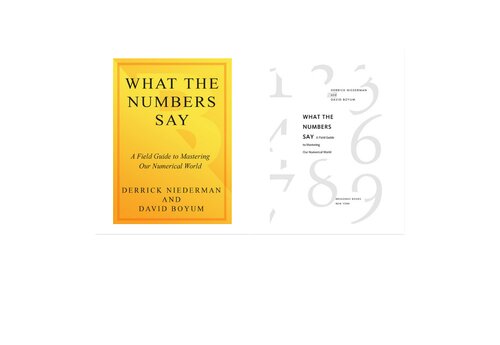

Most ebook files are in PDF format, so you can easily read them using various software such as Foxit Reader or directly on the Google Chrome browser.
Some ebook files are released by publishers in other formats such as .awz, .mobi, .epub, .fb2, etc. You may need to install specific software to read these formats on mobile/PC, such as Calibre.
Please read the tutorial at this link. https://ebooknice.com/page/post?id=faq
We offer FREE conversion to the popular formats you request; however, this may take some time. Therefore, right after payment, please email us, and we will try to provide the service as quickly as possible.
For some exceptional file formats or broken links (if any), please refrain from opening any disputes. Instead, email us first, and we will try to assist within a maximum of 6 hours.
EbookNice Team

Status:
Available4.3
8 reviews
ISBN-10 : 0307419568
ISBN-13 : 9780307419569
Author: Derrick Niederman, David Boyum
A decade ago, computer scientist Douglas Hofstadter coined the term innumeracy, which aptly described the widespread ailment of poor quantitative thinking in American society. So, in What the Numbers Say, Derrick Niederman and David Boyum present clear and comprehensible methods to help us process and calculate our way through the world of “data smog” that we live in. Avoiding abstruse formulations and equations, Niederman and Boyum anchor their presentations in the real world by covering a particular quantitative idea in relation to a context–like probability in the stock market or interest-rate percentages. And while this information is useful toward helping us to be more financially adept, What the Numbers Say is not merely about money. We learn why there were such dramatic polling swings in the 2000 U.S. presidential election and why the system of scoring for women’s figure skating was so controversial in the 2002 Winter Olympics, showing us that good quantitative thinking skills are not only practical but fun.
Chapter 1
Chapter 2
Attitude Is Everything
Navigational Tools
Illuminating Numbers
Uncertainty
Estimation
Chapter 3
Units 101
What Is an Acre?
Conversions: Putting Units Together
Taking the Measure of Measurement
One Size Fits All?
Bias and Precision
Beware of Strangers Bearing Zeros
Chapter 4
The Linearity Trap
The Trap of Negative Returns
Percents of Percents
When Percentages Aren’t the Answer
The 0-to-100 Trap
You Can’t Get There from Here
Percentages, Policy, and Pareto
Epilogue
Chapter 5
Orders of Magnitude and the Principle of Proximity
Numbers on a National Scale
Pareto’s Law and Political Symbolism
The Trouble with Small Numbers
How Small Things Become Big
Sensitive Numbers
Survivorship Bias
The Tactics of Big Numbers
Chapter 6
Modeling Through Hidden Curves
At the Margin
Square Curves
Exponential Growth
The Rule of 72
Exponential Decay
Curvature in Policy: Progressive Taxation
The Curvature of the Flat Tax
Ponzi Schemes, Savings and Loans, and Social Security
Chapter 7
What Is Probability?
The Frequentist School
Subjective Probability
Expressing Probabilities
The Arithmetic of Probabilities
Second-Guessing Yourself
Bayes Watch
Babylonian Oddsmaking
Probability Distributions
Chapter 8
The Power of Randomness
Back to Normal
Correlation and Causation
Testing the Hypothesis
Sample Sizes
Data Mining
Survey Research
Deviations from the Mean
Chapter 9
The Math Wars
Math versus Quantitative Reasoning
The Role of Mathematics Education
Less Is More
Relieving the Tedium
The Mixed Blessing of Calculators
The Glass Is Half Full
The Glass Is Half Empty
The Role of Government
Endnotes
what does the bible say about angel numbers
what does the bible say about numbers
what are the numbers dentists say
what do the numbers dentists say mean
what does the bible say about repeating numbers
Tags: Numbers, Field Guide, Mastering, Numerical World, Derrick Niederman, David Boyum